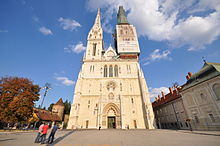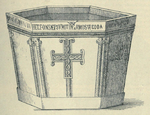Roman Catholic Archdiocese of Zagreb
Metropolitan Archdiocese of Zagreb Archidioecesis Metropolitae Zagrebiensis Zagrebačka nadbiskupija i metropolija | |
|---|---|
 Zagreb Cathedral | |
| Location | |
| Country | |
| Statistics | |
| Area | 4,246 km2 (1,639 sq mi) |
| Population - Total - Catholics | (as of 2017) |
| Parishes | 205 |
| Information | |
| Denomination | Catholic |
| Sui iuris church | Latin Church |
| Rite | Roman Rite |
| Established | 1094 |
| Cathedral | Cathedral of the Assumption of Mary |
| Patron saint | Blessed Alojzije Stepinac |
| Current leadership | |
| Pope | Francis |
| Archbishop | Dražen Kutleša |
| Metropolitan Archbishop | Dražen Kutleša |
| Auxiliary Bishops | Ivan Šaško Mijo Gorski |
| Bishops emeritus | Cardinal Josip Bozanić |
| Website | |
| zg-nadbiskupija.hr | |
| Part of a series on the |
| Catholic Church in Croatia |
|---|
 |
The Metropolitan Archdiocese of Zagreb (Latin: Archidioecesis Metropolitae Zagrebiensis; Croatian: Zagrebačka nadbiskupija i metropolija) is the central Latin Church archdiocese of the Catholic Church in Croatia, centered in the capital city Zagreb.[1] It is the metropolitan see of Croatia, and the present archbishop is Dražen Kutleša.[2] It encompasses the northwestern continental areas of Croatia.
Background
[edit]The territory of the present-day Archdiocese of Zagreb was part of the Roman province of Pannonia Savia, centered around the busy river port of Sisak. Christianity started to spread in Pannonia in the 3rd century. The capital of province, Sisak got its first bishop in the second half of the 3rd century. Bishop Castus was mentioned for the first time in 249 A.D. during Emperor Decius’s reign. One of the more notable bishops is Quirinus of Sescia, who suffered during the persecutions of Diocletian.[3]
Sisak was suffragan first to Sirmium, then to Solin but was abolished in the seventh century during the turbulent Avar and Slavic migrations. For a while the area was under the Patriarch of Aquileia. During the rule of Vladislav of Croatia (821–835), all of Croatia except the Archdiocese of Nin became subject to the Patriarchate of Constantinople, under the jurisdiction of the Archbishopric of Spalatum.[4] Later, the Councils of Split confirmed the Archbishopric of Split as the archepiscopal see having the right to govern all parishes on Croatian territory.[5]
History
[edit]This section needs expansion. You can help by adding to it. (August 2023) |
The diocese of Zagreb was founded by Ladislaus I of Hungary in 1094. It belonged to the Metropolitan Archdiocese of Esztergom until 1180, when it came under the jurisdiction of the Archdiocese of Kalocsa. King Ladislav was not on good terms with Pope Urban II, who supported King Zvonimir, and did not approve Ladislus' policy towards Croatia. Ladislav then obtained approval for the foundation of the diocese from the Antipope Clement III.[6] After the end of the Avignon papacy, the Diocese was not abolished as the Pope did not oppose its existence.
In 1227 Pope Gregory IX confirmed the grants and privileges of the Zagreb Diocese, among which the most important, the Felitianus’ Charter from 1134 A.D., the oldest preserved document of Croatian land between the rivers Sava and Drava.[6] Coloman, King of Hungary was crowned king of Croatia in Biograd na Moru in 1102.[7] Thus, the Diocese of Zagreb remained under the sponsorship of the King of Croatia and Hungary. The territory of the diocese changed several times throughout history.
On November 11, 1852, it was elevated to the status of an archdiocese.
Suffragan dioceses
[edit]
- Roman Catholic Diocese of Bjelovar-Križevci
- Eparchy of Križevci (Greek-Catholic)
- Roman Catholic Diocese of Sisak
- Roman Catholic Diocese of Varaždin
Ordinaries
[edit]- Bishops
- Fancica (c. 1125/28–1131)
- Dominic (1193–1201)
- Stephen II (1225–1247)
- Philip Türje (1247–1262)
- Farkas Bejc (1262–1263; elected)
- Timothy (1263–1287)
- Anthony (1287)
- John (1288–1295)
- Michael Bő (1296–1303)
- Augustin Kažotić (1303–1323)
- Nicholas Vásári (1349)
- Nicholas Apáti (1350–1356)
- Paul Horvat (1379–1386)
- Thomas de Branche de Debrentha, O.S.B. (11 October 1454 – 13 January 1463)
- Nicolaus Olahus (1543–1548)
- Wolfang Vuk de Gyula (1548–1550)
- Juraj Drašković (22 March 1564 – 27 October 1578)
- Nikola Stepanić Selnički (1598–1602)
- Miklós Zelniczey Naprady (15 December 1600 – 1604)
- Šimun Bratulić, O.S.P.P.E. (13 September 1604 – 1611)[8]
- Petar Domitrović (15 July 1613 – 1629)
- Franjo Ergelski Hasanović (17 December 1629 – 1642)
- Benedikt Vinković (28 April 1642 – 1643)
- Martin Bogdan (1643–1647)
- Petar Petretić (1648 – 3 August 1667)
- Martin Borković, O.S.P.P.E. (11 June 1668 – 31 October 1687)
- Aleksandar Ignacije Mikulić Brokunovečki (11 October 1688 – 11 May 1694)
- Stjepan Seliščević (10 January 1695 – 1 April 1703)
- Márton Brajkovićs (14 January 1704 – 4 June 1708)
- Imre Esterházy, O.S.P.P.E. (9 September 1709 – 17 March 1727)
- Juraj Branjug (26 November 1727 – 28 April 1748)
- Franjo Klobusiczky (2 December 1748 – 20 Dec 1751)
- Franjo Thauszy (24 January 1752 – 11 January 1769)
- Ivan Krstitelj Paxy (10 September 1770 appointed – 20 December 1771)
- Josip Galjuf (14 December 1772 – 3 February 1786)
- Maksimilijan Vrhovac (10 March 1788 – 16 December 1827)
- Aleksandar Alagović (15 March 1830 – 18 March 1837)[8]
- Archbishops
- Juraj Haulik (2 October 1837 – 11 May 1869)
- Josip Mihalović (27 June 1870 – 19 February 1891)
- Juraj Posilović (18 May 1894 – 26 April 1914)
- Antun Bauer (26 April 1914 – 9 December 1937)
- Alojzije Stepinac (7 December 1937 – 10 February 1960)
- Franjo Šeper (5 March 1960 – 20 August 1969)
- Franjo Kuharić (16 June 1970 – 5 July 1997)
- Josip Bozanić (5 July 1997 – 15 April 2023)
- Dražen Kutleša (15 April 2023 – present)
Auxiliary Bishops
[edit]- Franjo Salis-Seewis, titular bishop of Corycus (23 April 1926 – 27 October 1967)
- Josip Lach, titular bishop of Dodona (11 December 1939 – 12 September 1983)
- Franjo Kuharić, titular bishop of Meta (15 February 1964 – 16 June 1970)
- Josip Salač, titular bishop of Baliana (16 June 1970 – 19 December 1975)
- Mijo Škvorc, S.J., titular bishop of Hadrumetum (16 June 1970 – 15 February 1989)
- Đuro Kokša, titular bishop of Grumentum (20 April 1978 – 26 November 1998)
- Juraj Jezerinac, titular bishop of Strumnitza (11 April 1991 – 25 April 1997)
- Marko Culej, titular bishop of Limata (7 January 1992 – 5 July 1997)
- Josip Mrzljak, titular bishop of Caltadria (29 December 1998 – 20 March 2007)
- Vlado Košić, titular bishop of Ruspae (29 December 1998 – 5 December 2009)
- Valentin Pozaić, S.J., titular bishop of Petina (2 February 2005 – 13 May 2017)
- Ivan Šaško, titular bishop of Rotaria (11 February 2008 – present)
- Mijo Gorski, titular bishop of Epidaurum (3 May 2010 – present)
References
[edit]- ^ Archdiocese of Zagreb, catholic-hierarchy.org.
- ^ Metropolitan Archdiocese of Zagreb, gcatholic.org.
- ^ Kirsch, Johann Peter. "Sts. Quirinus." The Catholic Encyclopedia Vol. 12. New York: Robert Appleton Company, 1911. 20 August 2023
 This article incorporates text from this source, which is in the public domain.
This article incorporates text from this source, which is in the public domain.
- ^ Matthew Spinka, A history of Christianity in the Balkans: a study in the spread of Byzantine culture among the Slavs, pp. 19–20
- ^ Budak, Neven (1994). Prva stoljeća Hrvatske (PDF) (in Croatian). Zagreb: Hrvatska sveučilišna naklada. ISBN 953-169-032-4.
- ^ a b "Zagrebačka nadbiskupija" [Archdiocese of Zagreb]. Croatian Encyclopaedia (in Croatian). 2020. Retrieved 30 December 2020.
- ^ Curta, Florin (2006). Southeastern Europe in the Middle Ages, 500–1250. Cambridge University Press. ISBN 978-0-521-89452-4.
- ^ a b Metropolitan Archdiocese of Zagreb - Bishops, on gcatholic.org.
